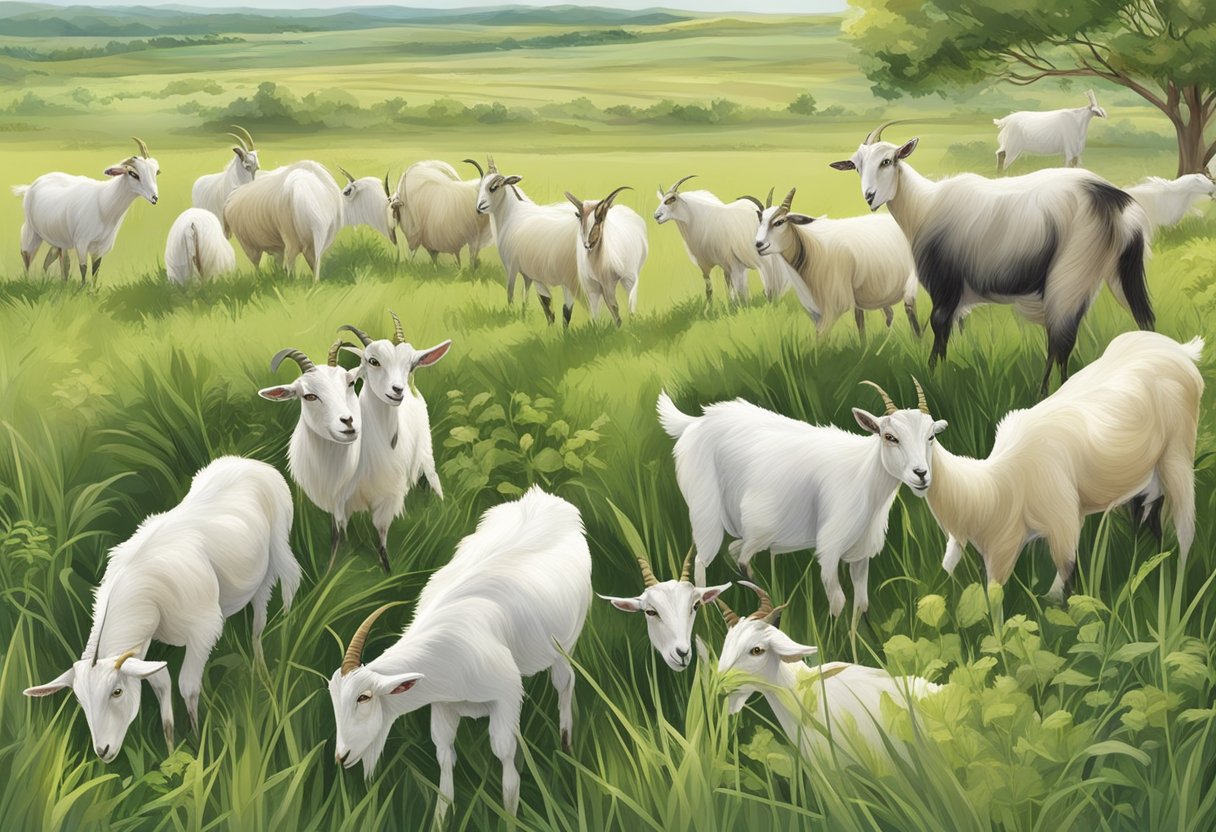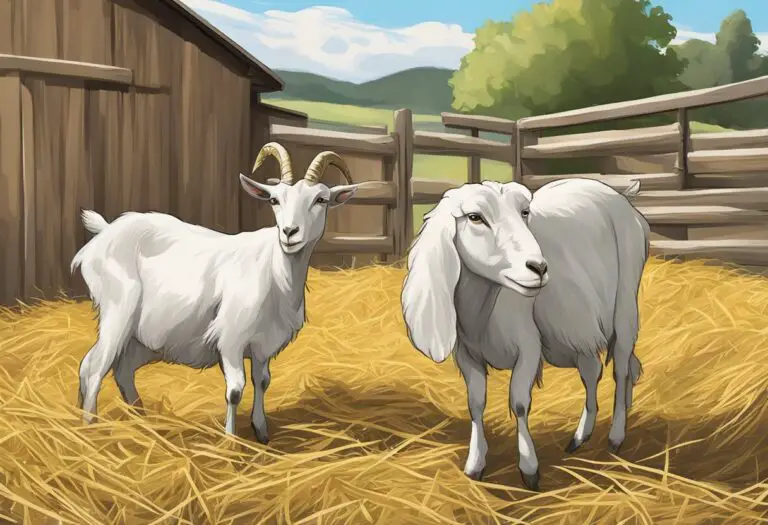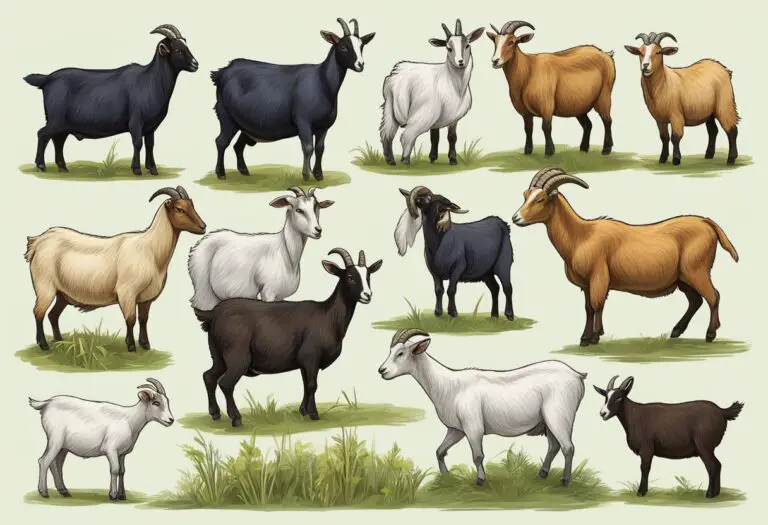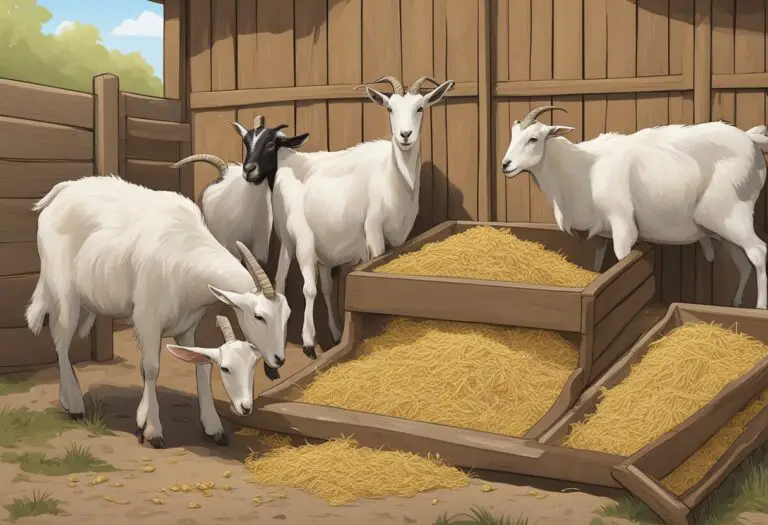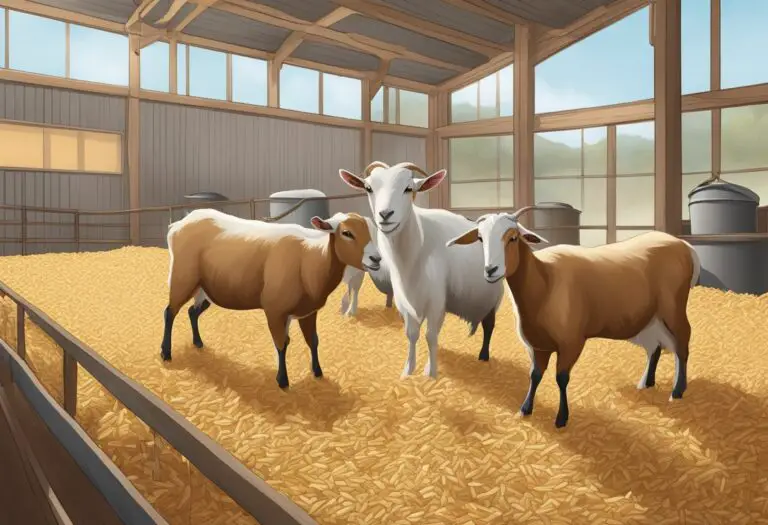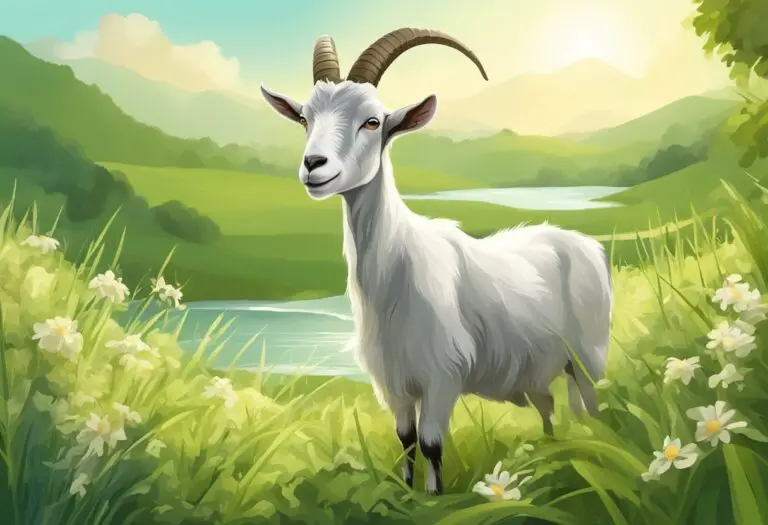What Are the Nutritional Requirements of Goats? A Comprehensive Guide
Goats are ruminant animals that have a unique digestive system that allows them to extract nutrients from fibrous plant material. As a result, their nutritional requirements differ from other livestock animals, such as cows or pigs. To maintain good health and productivity, goats require a balanced diet that meets their specific nutritional needs.
The nutritional requirements of goats vary depending on their age, sex, weight, and stage of production, such as gestation or lactation. Generally, goats require a diet that is high in fiber, energy, protein, minerals, and vitamins. It is important to note that goats have a low tolerance for dietary imbalances, which can lead to health problems and decreased productivity. Therefore, it is crucial to understand the specific nutritional needs of goats and provide them with a well-balanced diet to ensure their optimal health and performance.
Basic Nutritional Needs of Goats

Goats are ruminants, which means they have a four-chambered stomach that allows them to digest tough plant materials. They require a balanced diet that includes roughage, concentrates, and water to maintain good health and productivity.
Roughage
Roughage is the primary component of a goat’s diet and includes hay, grass, and other forages. It provides the necessary fiber that helps keep the digestive system functioning properly. Goats should have access to roughage at all times and consume about 2-4% of their body weight in roughage daily.
Concentrates
Concentrates are grains and other feedstuffs that provide energy, protein, and other nutrients to goats. They should be fed in moderation and only as a supplement to roughage. Too much concentrate can lead to digestive problems and obesity.
Water
Water is essential for goats to maintain good health and proper digestion. They should have access to clean, fresh water at all times. A mature goat can drink up to 1-2 gallons of water per day, depending on the temperature and level of activity.
In addition to roughage, concentrates, and water, goats also require minerals and vitamins to maintain good health. A balanced diet that meets all of their nutritional needs is essential for optimal growth, reproduction, and milk production.
Energy Requirements

Goats require energy in their diet to maintain their body functions, support growth, and produce milk. The energy requirements of goats depend on their age, weight, and level of activity.
Carbohydrates
Carbohydrates are the primary source of energy for goats. They are broken down into glucose, which is used by the body for energy. Good sources of carbohydrates for goats include grains, hay, and pasture. However, it is important to note that goats have a unique digestive system that is adapted to digesting fibrous plant material. Therefore, their diet should consist of a high proportion of fibrous carbohydrates, such as hay and pasture, rather than simple carbohydrates, such as grains.
Fats
Fats are a concentrated source of energy for goats. They provide more than twice the amount of energy per gram as carbohydrates. Good sources of fats for goats include vegetable oil, animal fat, and seeds. However, it is important to note that goats do not require high levels of fat in their diet. Excessive fat intake can lead to obesity and other health problems. Therefore, fats should be included in the diet in moderation.
In summary, goats require a diet that is high in fibrous carbohydrates and moderate in fats to meet their energy requirements. It is important to provide a balanced diet that meets all of their nutritional needs to maintain their health and productivity.
Protein Requirements

Amino Acids
Protein is essential for the growth and maintenance of goats. Amino acids are the building blocks of protein, and goats require a balanced supply of these amino acids to maintain optimal health. There are 20 amino acids, and goats require 10 of them in their diet. These 10 essential amino acids cannot be synthesized by the goat’s body and must be obtained through their diet.
Protein Sources
Goats can obtain protein from various sources, including plants, insects, and animal products. The quality of the protein is determined by the amino acid composition. Goats require high-quality protein sources to meet their nutritional requirements. Some good sources of protein for goats include alfalfa, clover, soybean meal, and cottonseed meal.
It is essential to ensure that goats receive a balanced diet that meets their protein requirements. A diet that is deficient in protein can lead to stunted growth, poor immune function, and reduced milk production. On the other hand, excess protein in the diet can lead to kidney damage and other health problems. Therefore, it is crucial to provide goats with a balanced diet that meets their protein requirements without exceeding their needs.
Vitamins and Minerals

Essential Vitamins
Goats require essential vitamins for various metabolic functions, growth, and reproduction. The following are some of the essential vitamins that goats require in their diet:
- Vitamin A: It is essential for maintaining healthy skin, vision, and immune system.
- Vitamin D: It helps in calcium absorption and is necessary for bone development.
- Vitamin E: It is an antioxidant that helps in maintaining healthy skin and reproductive health.
- Vitamin K: It is essential for blood clotting.
Macro and Trace Minerals
Goats require macro and trace minerals for various physiological functions, including bone development, muscle function, and enzyme activity. The following are some of the macro and trace minerals that goats require in their diet:
- Calcium: It is essential for bone and teeth development, muscle function, and blood clotting.
- Phosphorus: It is necessary for bone development, energy metabolism, and muscle function.
- Magnesium: It is essential for muscle function, nerve transmission, and bone development.
- Sodium and Chloride: They are necessary for maintaining fluid balance and electrolyte balance in the body.
- Iron: It is essential for the formation of hemoglobin and oxygen transport in the body.
- Copper: It is necessary for the formation of connective tissue, iron metabolism, and immune function.
- Zinc: It is essential for growth, immune function, and wound healing.
- Selenium: It is necessary for antioxidant function and immune function.
It is important to note that goats require different amounts of vitamins and minerals depending on their age, weight, and physiological status. Therefore, it is essential to provide them with a balanced diet that meets their nutritional requirements.
Water Intake

Water is an essential nutrient for goats and is required for various physiological processes. The amount of water a goat needs depends on several factors, including age, weight, and environmental conditions. For instance, lactating goats require more water than non-lactating goats, and goats living in hot and dry environments need more water than those living in cooler environments.
On average, goats require about 2-4 liters of water per day, but this can vary depending on the factors mentioned above. It is crucial to ensure that goats have access to clean and fresh water at all times. Dirty water can lead to health problems and reduced water intake, which can affect the goat’s overall health and productivity.
Goats can obtain water from various sources, including troughs, buckets, and natural sources such as streams and ponds. However, it is essential to ensure that the water source is safe and free from contaminants. For example, stagnant water can contain harmful bacteria and parasites, which can cause diseases in goats.
In conclusion, water is a vital nutrient for goats, and providing clean and fresh water is crucial for their health and productivity. It is essential to monitor the water intake of goats and ensure that they have access to water at all times, especially during hot and dry weather conditions.
Life Stage Nutrition

Kids and Weanlings
Kids and weanlings require a diet that is rich in protein, energy, and minerals to support their rapid growth and development. Their diet should consist of high-quality milk replacer or pasteurized milk, supplemented with hay and starter feed. The starter feed should contain at least 16% protein and 70% total digestible nutrients (TDN) to meet their nutritional requirements.
During the first few weeks of life, kids should be fed colostrum, which provides essential antibodies to protect them from diseases. After that, they can be gradually weaned onto milk replacer or pasteurized milk. It is important to monitor their growth and adjust their diet accordingly to ensure they are getting enough nutrients.
Adult Goats
Adult goats require a balanced diet that meets their maintenance requirements and provides enough energy for their daily activities. Their diet should consist of good quality hay, pasture, and a small amount of concentrate feed. The concentrate feed should contain at least 12% protein and 70% TDN to meet their nutritional requirements.
It is important to provide clean water and minerals to adult goats at all times. They also require salt to maintain their electrolyte balance.
Pregnant and Lactating Does
Pregnant and lactating does have higher nutritional requirements than adult goats. During pregnancy, they require additional energy, protein, and minerals to support the growth and development of their fetuses. During lactation, they require even more energy, protein, and minerals to produce milk for their kids.
Their diet should consist of good quality hay, pasture, and concentrate feed. The concentrate feed should contain at least 16% protein and 75% TDN to meet their nutritional requirements. It is important to monitor their body condition and adjust their diet accordingly to ensure they are getting enough nutrients.
In conclusion, providing goats with a balanced diet that meets their nutritional requirements is essential for their health and productivity. By understanding their life stage nutritional requirements, goat owners can ensure that their goats are getting the nutrients they need to thrive.
Feeding Practices

Goats are ruminants and require a diet that is high in fiber, low in protein, and balanced in minerals and vitamins. Feeding practices for goats should take into consideration their nutritional requirements, age, weight, and stage of production.
Forage and Pasture Management
Forage and pasture management are critical components of goat nutrition. Goats prefer to browse and graze on a variety of plants, and their diet should include a mixture of grasses, legumes, and browse. The quality and quantity of forage and pasture will depend on the soil type, climate, and management practices.
To ensure that goats have access to high-quality forage, it is essential to manage pastures and forage crops properly. This includes regular soil testing, fertilization, weed control, and rotational grazing. Rotational grazing helps to prevent overgrazing and allows forage to recover between grazing periods.
Supplemental Feeding
In addition to forage and pasture, goats may require supplemental feeding to meet their nutritional requirements. The type and amount of supplemental feed will depend on the age, weight, and stage of production of the goats.
Common supplemental feeds for goats include hay, silage, and concentrates. Hay and silage are good sources of fiber, while concentrates provide energy, protein, and minerals. It is essential to provide goats with a balanced diet that meets their nutritional requirements and does not cause digestive problems.
Toxic Plants to Avoid
Goats are selective feeders and may consume toxic plants if they are present in their grazing area. Some common toxic plants for goats include hemlock, nightshade, and wild cherry. It is essential to identify and remove toxic plants from grazing areas to prevent poisoning.
In conclusion, feeding practices for goats should be based on their nutritional requirements, age, weight, and stage of production. Forage and pasture management, supplemental feeding, and avoiding toxic plants are critical components of goat nutrition. Proper feeding practices will help to ensure that goats remain healthy and productive.
Nutritional Deficiencies and Health

Common Deficiencies
Goats are susceptible to various nutritional deficiencies, which can lead to poor health and reduced productivity. The most common deficiencies include:
- Protein deficiency: This can cause stunted growth, poor muscle development, and reduced milk production.
- Energy deficiency: This can lead to weight loss, reduced milk production, and poor reproductive performance.
- Vitamin A deficiency: This can cause poor vision, reduced immunity, and reproductive problems.
- Calcium deficiency: This can lead to weak bones, poor muscle function, and milk fever in pregnant goats.
- Phosphorus deficiency: This can cause poor growth, reduced milk production, and weak bones.
To prevent these deficiencies, goats should be fed a balanced diet that meets their nutritional requirements. This can include a combination of forage, grains, and supplements.
Health Issues Related to Nutrition
Poor nutrition can also lead to various health issues in goats. These include:
- Parasite infestations: Goats with poor nutrition are more susceptible to internal and external parasites, which can cause anemia, weight loss, and poor growth.
- Metabolic disorders: Goats with imbalanced diets can develop metabolic disorders such as ketosis, acidosis, and hypocalcemia, which can cause poor health and reduced productivity.
- Reproductive problems: Poor nutrition can lead to reduced fertility, increased abortion rates, and poor lactation in does.
- Lameness: Calcium and phosphorus deficiencies can cause weak bones and joints, leading to lameness and reduced mobility.
To maintain good health and productivity, goats should be fed a balanced diet that meets their nutritional requirements. Regular health checks and parasite control measures should also be implemented.

